七年级下册U8
七下U8知识点范文
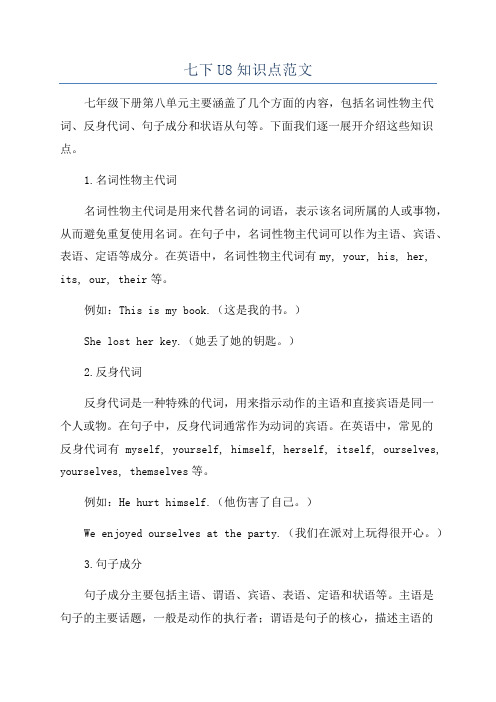
七下U8知识点范文七年级下册第八单元主要涵盖了几个方面的内容,包括名词性物主代词、反身代词、句子成分和状语从句等。
下面我们逐一展开介绍这些知识点。
1.名词性物主代词名词性物主代词是用来代替名词的词语,表示该名词所属的人或事物,从而避免重复使用名词。
在句子中,名词性物主代词可以作为主语、宾语、表语、定语等成分。
在英语中,名词性物主代词有my, your, his, her, its, our, their等。
例如:This is my book.(这是我的书。
)She lost her key.(她丢了她的钥匙。
)2.反身代词反身代词是一种特殊的代词,用来指示动作的主语和直接宾语是同一个人或物。
在句子中,反身代词通常作为动词的宾语。
在英语中,常见的反身代词有myself, yourself, himself, herself, itself, ourselves, yourselves, themselves等。
例如:He hurt himself.(他伤害了自己。
)We enjoyed ourselves at the party.(我们在派对上玩得很开心。
)3.句子成分句子成分主要包括主语、谓语、宾语、表语、定语和状语等。
主语是句子的主要话题,一般是动作的执行者;谓语是句子的核心,描述主语的动作或状态;宾语接在动词后面,说明主语动作的承受者;表语用来说明主语的特征或状态;定语用来修饰名词或代词;状语用来说明时间、地点、方式、原因等情况。
例如:She is reading a book.(她正在读一本书。
)They gave him a present.(他们给了他一个礼物。
)4.状语从句状语从句是从句的一种,用来修饰主句中的动词、形容词、副词等,在句子中起着状语的作用。
状语从句通常由连词引导,例如when, while, if, because, although等。
Although he is busy, he helps others.(虽然他很忙,但他仍然帮助别人。
七年级英语下册Unit8笔记短语句型话题作文
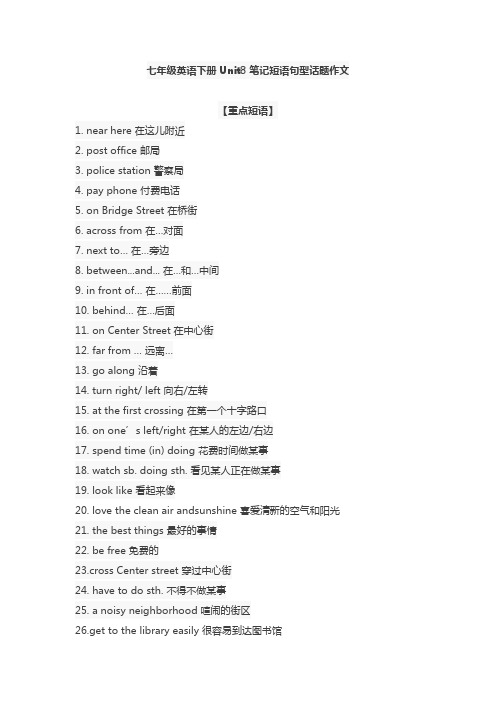
七年级英语下册Unit8笔记短语句型话题作文【重点短语】1. near here 在这儿附近2. post office 邮局3. police station 警察局4. pay phone 付费电话5. on Bridge Street 在桥街6. across from 在…对面7. next to…在…旁边8. between...and... 在…和…中间9. in front of…在……前面10. behind…在…后面11. on Center Street 在中心街12. far from …远离…13. go along 沿着14. turn right/ left 向右/左转15. at the first crossing 在第一个十字路口16. on one’s left/right在某人的左边/右边17. spend time (in) doing 花费时间做某事18. watch sb. doing sth. 看见某人正在做某事19. look like 看起来像20. love the clean air andsunshine 喜爱清新的空气和阳光21. the best things 最好的事情22. be free 免费的23.cross Center street 穿过中心街24. have to do sth. 不得不做某事25. a noisy neighborhood 喧闹的街区26.get to the library easily 很容易到达图书馆27. enjoy doing sth. 喜欢做某事28. go shopping 去购物29. be busy 忙的30. make the foods 做食物【重点句型】1.---Where are the pay phones? 付费电话在什么地方?---They’re between the post office and the library.在邮局与图书馆之间。
新人教版七年级英语下unit8课件PPT
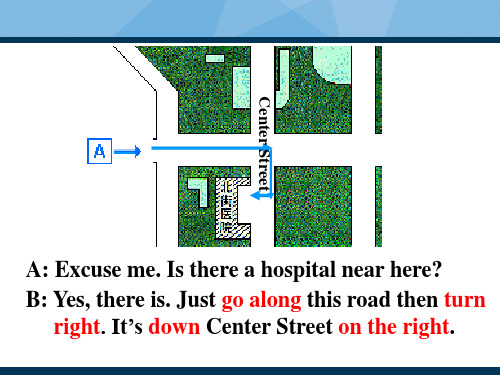
Grammar Focus
Is there a bank near here?
Are there any restaurants near here? Where’s the hotel?
Where’s the bank? Where’s the park?
Where are the pay phones?
here? Linda: Yes, there is. It’s on Center Street. It’s across
from the park. Tony: Oh … where’s Center Street? Linda: It’s not too far from here. I can walk with you. Tony: Oh, that’s great! Thanks so much. Linda: No problem.
G
F
CITY STREET
A PARK STREET
B
E
D C
1. You are at A. Go along Park Street. It’s on the right. Now you are at _______. B
2. You are at A. Go along Park Street and turn right. It’s down the City Street on the right. Now you are at __C___.
Center Street
A: Excuse me. Is there a hospital near here? B: Yes, there is. Just go along this road then turn
新人教七年级下册英语unit-8重点知识点解析及练习(无答案

新人教七年级下册英语unit 8重点知识点解析及练习1、在英语中,“问路”的说法有很多种。
Excuse me. Where is the pay phone ?Excuse me. How can I get to the library ?Excuse me. Can you tell me how to get to the library ?Excuse me. Can you tell me the way to the library ?Is there a library near here/around here/in the neighborhood?回答:Go straight ( until the end ).Go down/along Bridge Street.Turn left/right.Go across the street.It’s down/along New Street on the left/right.Turn left/right at the first crossing(十字路口).Take the first turning(转弯处)on the left/right.2、表示方位的词语1)next to 接近, 邻近(近义词near)It is next to/near the hotel.它邻近宾馆。
He is standing near/next to his father.他站在他父亲旁边。
2)near 也有表示在某物的附近, 意为“靠近, 接近”。
The football is near the door. 足球在门旁边。
near 除了作介词表示方位外, 还可以作形容词,意思是“近的, 不远的”, 其反义词是far, 意为“远的,遥远的”。
My home is very near from my school.我家离学校很近。
3)across from 介词词组, 意为“在……的对面”。
七年级下册英语unit8

七年级下册英语unit8Unit 8: Planning a TripIntroduction:In this unit, we will focus on planning a trip. We will learn about different ways to travel, such as by train, plane, or ship, and we will also study various tourist attractions and destinations around the world. Additionally, we will explore common phrases and vocabulary related to traveling. By the end of this unit, you will be able to plan and describe your dream trip.Lesson 1: Methods of TransportationIn this lesson, we will learn about different methods of transportation. We will study vocabulary related to traveling by train, plane, or ship. We will also practice using phrases like "book a ticket," "check-in," and "board the plane." By the end of this lesson, you will be able to confidently describe your preferred method of transportation for a trip.Lesson 2: Popular Tourist AttractionsIn lesson 2, we will explore popular tourist attractions around the world. We will learn aboutfamous landmarks such as the Great Wall of China, the Eiffel Tower, and the Statue of Liberty. We will work on vocabulary related to describing these attractions, including words like "stunning," "breathtaking," and "historic." By the end of this lesson, you will be able to talk about your favorite tourist attractions and explain why they are worth visiting.Lesson 3: Planning the ItineraryIn this lesson, we will focus on planning the itinerary for a trip. We will discuss how to choose a destination, research activities, and create a schedule. We will learn useful vocabulary and phrases, such as "sightseeing," "accommodation," and "local cuisine." By the end of this lesson, you will be able to plan a detailed itinerary for your dream trip.Lesson 4: Booking AccommodationLesson 4 will cover the topic of booking accommodation. We will study different types of accommodation, including hotels, hostels, and vacation rentals. We will learn how to make reservations, ask for availability, and understand hotel amenities. By the end of this lesson, you will be able to confidentlybook accommodation for your trip and assess the quality of different options.Lesson 5: Packing for a TripIn this lesson, we will learn about packing for a trip. We will study vocabulary related to clothing, toiletries, and travel essentials. We will also discuss tips for efficient packing and staying organized. By the end of this lesson, you will be able to pack your suitcase with everything you need for your trip.Lesson 6: Describing Past TripsIn lesson 6, we will practice describing past trips. We will learn how to talk about our travel experiences, including the places we visited, the activities we did, and the people we met. We will practice using suitable tenses and vocabulary to share our adventures with others. By the end of this lesson, you will be able to confidently describe a memorable trip you've taken. Conclusion:By the end of this unit, you will have developed the necessary skills to plan and describe your dream trip. You will be able to discuss different methods of transportation, describe popular tourist attractions,plan a detailed itinerary, book accommodation, pack efficiently, and share your travel experiences. These skills will not only improve your English but also prepare you for future trips and adventures.。
七年级英语下册Unit8单词表附音标

七年级英语下册Unit8单词表附音标人教版七年级英语下册Unit8单词表附音标英语是印欧语系-日耳曼语族下的语言,由26个字母组成,是欧盟以及许多国际组织以及英联邦国家的官方语言,亦是世界上使用最广泛的语言。
下面为大家带来七年级英语下册Unit8单词表附音标,快来看看吧。
七年级英语下册Unit8单词表附音标1post邮政n./ pEust/office办公室n./ Rfis/post office邮局police 警察n./ pEli:s/police station警察局hotel旅馆;酒店n./ hEutel/restaurant餐馆n./ restErRN/bank银行n./ bANk/hospital医院n./ hRspitEl/street大街n./ stri:t/pay付费v.&n./ pei/pay phone付费电话near在……附近prep./ niE/across过;穿过adv.&prep./ EkrRs/across from在……对面front前面n./ frQnt/in front of在……前面behind在……后面prep./ bihaind/town镇;市镇n./ taun/around到处;大约adv.&prep./ Eraund/north北;北方;北方的n.&adj.along沿着prep./ ElRN/go along沿着(这条街)走turn转向;翻v./ tE:n/right向右边;右边adv.&n./ rait/left向左边;左边adv.&n./ left/turn right向右turn left左转crossing十字路口n./ krRsiN/neighborhood街区;街坊n./ neibEhud/spend花(时间、钱等)v./ spend/spend time花时间climb爬v./ klaim/road路n./ rEud/often时常;常常adv./ R:fn/air空气n./ ZE/sunshine阳光n./ sQnFain/free免费的adj./ fri:/enjoy享受;喜爱v./ indVRi/enjoy reading喜欢阅读easily容易地adv./ i:zili/money钱n./ mQni/七年级英语下册Unit8单词表附音标2camp扎营;搭帐篷v./ kAmp/lake湖;湖泊n./ leik/beach海滩;沙滩n./ bi:tF/badminton羽毛球运动n./ 'bAdmintEn/ sheep羊;绵羊n./ Fi:p/as作为;当作prep.&adv./ Az/natural自然的adj./ 'nAtFErEl/butterfly蝴蝶n./ 'bQtEflai/visitor游客;访问者n./ 'vizitE/tired疲倦的;疲劳的adj./ taiEd/stay停留;待v./ stei/stay up late深夜不留睡;熬夜away离开;远离adv./ E'wei/run away跑开mouse老鼠;耗子/ maus/baby幼小的;婴儿adj.&n./ 'beibi/ shout呼叫;喊叫v./ Faut/shout at冲……大声叫嚷woof(狗叫声)汪汪int./ wu:f/ language语言n./ 'lANgwidV/fly飞v./ flai/kite风筝n./ kait/fiy a kite放风筝high高的(地)adj.&adv./ hai/high school中学ago以前adv./ E'gEu/India印度n./ 'indjE/tent帐篷n./ tent/put up搭起;举起moon月亮n./ mu:n/surprise惊奇;惊讶;使吃惊n.&v./ sE'praiz/ get a surprise吃惊snake蛇n./ sneik/scared惊慌的;吓坏了的adj.move移动v./ mu:v/shout to对……大声喊叫start开始;着手v./ stB:t/jump跳;跃v./ dVQmp/up and down上上下下;起伏wake 弄醒;醒v./ weik/wake…up把……弄醒into到……里面;进入prep./ 'intu:/forest森林n./ 'fRrist/ear耳朵n./ iE/七年级英语下册Unit8单词表附音标3 七下 Unit 5panda熊猫n./ 'pAndE/zoo动物园n./ zu:/tiger老虎n./ 'taigE/elephant大象n./ 'elifEnt/koala树袋熊;考拉n./ kE'B:lE/lion狮子n./ 'laiEn/giraffe长颈鹿n./ dVi'rB:f/animal动物n./ 'AnimEl/cute可爱的;机灵的adj./ kju:t/lazy懒散的;懒惰的adj./ 'leizi/smart聪明的adj./ smB:t/beautiful美丽的;美好的adj./ 'bju:tiful/ scary吓人的;恐怖的adj./ 'skZEri/kind种类n./ kaind/kind of稍微;有点儿Australia澳大利亚n./ R'streiljE/south南方的;南;南方adj.&n./ sauW/Africa非洲n./ 'AfrikE/South Africa南非pet宠物n./ pet/leg腿n./ leg/cat猫n./ kAt/sleep睡觉v.&n./ sli:p/friendly友好的adj./ 'frendli/shy羞怯的;腼腆的adj./ Fai/save救;救助v./ seiv/symbol象征n./ 'simbl/flag旗;旗帜n./ flAg/forget忘记;遗忘v./ fE'get/get lost迷路place地点;位置n./ pleis/water水n./ 'wR:tE/danger危险n./ 'deindVE/be in danger处于危险之中cut砍;切v./ kQt/down(坐、躺、倒)下;向下;沿着adv.&prep./ daun/ cut down砍倒tree树n./ tri:/kill杀死;弄死v./ kil/ivory象牙n./ 'aivEri/over超过,多于;在……上方prep./ 'EuvE/made of由……制成的七年级英语下册Unit8单词表附音标4rain下雨;雨水v.&n./ rein/windy多风的adj./ 'windi/cloudy多云的adj./ 'klaudi/sunny晴朗的adj./ 'sQni/snow下雪;雪v.&n./ snEu/weather天气n./ 'weTE/cook做饭v./ kuk/bad坏的;糟的adj./ bAd/park公园n./ pB:k/message信息;消息n./ 'mesidV/take a message捎个口信;传话him他(he的'宾格)pron./ him/could能;可以modal v./ kud/back回来;回原处adv./ bAk/call back(给某人)回电话problem困难;难题n./ 'prRblEm/again再一次;又一次adv./ E'gein/dry干燥的adj./ drai/cold寒冷的;冷的adj./ kEuld/hot热的adj./ hRt/warm温暖的adj./ wR:m/visit拜访;参观v./ 'vizit/Canada加拿大n./ 'kAnEdE/summer夏天;夏季n./ 'sQmE/sit坐v./ sit/juice果汁;饮料n./ dVu:s/soon不久;很快adv./ su:n/vacation假期n./ vei'keiFEn/on vacation度假hard努力地;困难的adv.&adj./ hB:d/Europe欧洲n./ 'juErEp/mountain高山n./ 'mauntin/country国;国家n./ 'kQntri/skate滑冰v./ skeit/snowy下雪的adj./ 'snEui/winter冬天;冬季n./ 'wintE/Russian俄罗斯的;俄罗斯人;俄语adj.&n./ 'rQFEn/ snowman雪人n./ 'snEumAn/rainy阴雨的;多雨的adj./ 'reini/【人教版七年级英语下册Unit8单词表附音标】。
人教版英语七年级下册Unit8练习题及答案解析
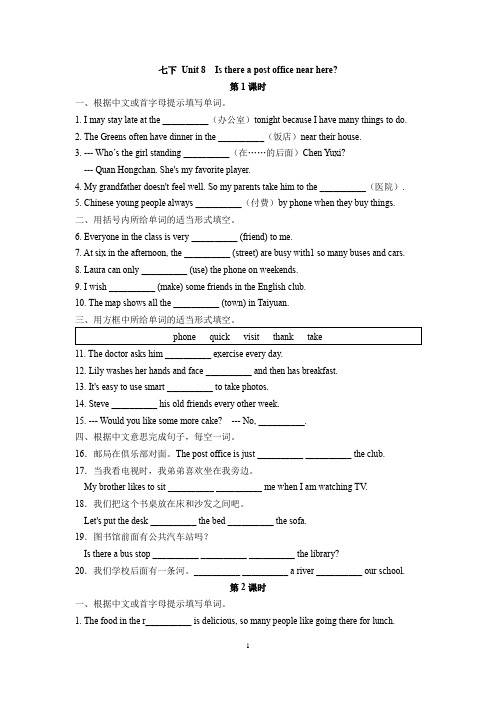
七下Unit 8 Is there a post office near here?第1课时一、根据中文或首字母提示填写单词。
1. I may stay late at the __________(办公室)tonight because I have many things to do.2. The Greens often have dinner in the __________(饭店)near their house.3. --- Who’s the girl standing __________(在……的后面)Chen Yuxi?--- Quan Hongchan. She's my favorite player.4. My grandfather doesn't feel well. So my parents take him to the __________(医院).5. Chinese young people always __________(付费)by phone when they buy things.二、用括号内所给单词的适当形式填空。
6. Everyone in the class is very __________ (friend) to me.7. At six in the afternoon, the __________ (street) are busy with1 so many buses and cars.8. Laura can only __________ (use) the phone on weekends.9. I wish __________ (make) some friends in the English club.10. The map shows all the __________ (town) in Taiyuan.11. The doctor asks him __________ exercise every day.12. Lily washes her hands and face __________ and then has breakfast.13. It's easy to use smart __________ to take photos.14. Steve __________ his old friends every other week.15. --- Would you like some more cake? --- No, __________.四、根据中文意思完成句子,每空一词。
仁爱英语七年级下册知识点归纳u8
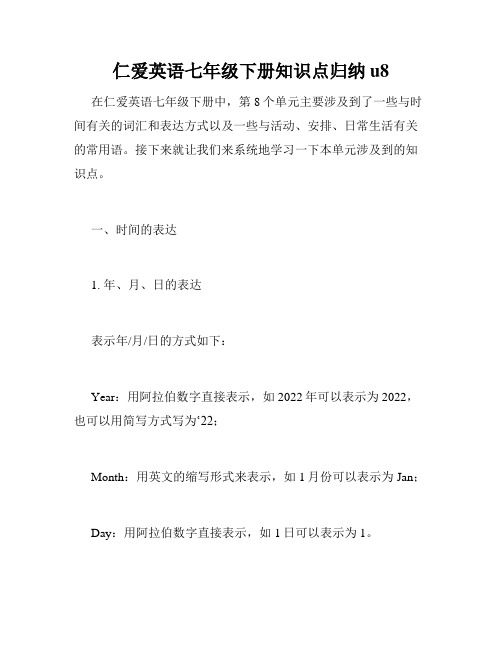
仁爱英语七年级下册知识点归纳u8在仁爱英语七年级下册中,第8个单元主要涉及到了一些与时间有关的词汇和表达方式以及一些与活动、安排、日常生活有关的常用语。
接下来就让我们来系统地学习一下本单元涉及到的知识点。
一、时间的表达1. 年、月、日的表达表示年/月/日的方式如下:Year:用阿拉伯数字直接表示,如2022年可以表示为2022,也可以用简写方式写为‘22;Month:用英文的缩写形式来表示,如1月份可以表示为Jan;Day:用阿拉伯数字直接表示,如1日可以表示为1。
同时,表示时间的单词还有以下几个:Hour:表示每小时,如6点表示为6 o'clock;Minute:表示分钟,如6点10分可以表示为10 minutespast/after 6 o'clock;Second:表示秒,如6点10分30秒可以表示为30 seconds past/after 6 o'clock。
2. 以“时间+to”的方式表示使用“时间+to”的方式表示当前时间离下一个时间点还有多少时间,如:It's ten to seven. 表示现在是6点50分左右;It's three minutes to noon. 表示现在距离中午12点还有3分钟。
3. 以“时间+past/after”的方式表示这种方式与“时间+to”的方式类似,只是表达的含义不同。
这里表示的是当前时间距离上一个时间点有多久,如:It's twenty minutes past eight. 表示现在是8点20分左右;It's ten minutes after four. 表示现在是4点10分左右。
二、与活动、安排、日常生活有关的常用语1. What time is it?表示“现在几点钟了?”2. I have to be at school by 7:30. 表示“我必须在7:30之前到达学校。
”3. What's your schedule like today?表示“你今天的日程安排怎么样?”4. I have a lot of homework to do. 表示“我有很多作业要做。
七下U8知识点
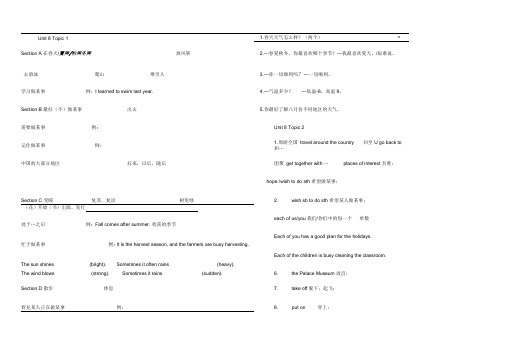
Unit 8 Topic 1 1.春天天气怎么样?(两个)= Section A 在春天/夏天/秋天冬天放风筝 2.---春夏秋冬,你最喜欢哪个季节?---我最喜欢夏天。
/很难说。
去游泳爬山堆雪人 3.---你一切顺利吗?---一切顺利。
学习做某事例:I learned to swim last year. 4.---气温多少?---低温-8,高温9。
Section B 最好(不)做某事出去 5.你最好了解八月份不同地区的天气。
需要做某事例:Unit 8 Topic 2记住做某事例:1.周游全国travel around the country 回至U go back to 和…中国的大部分地区后来,以后,随后团聚get together with …places of interest 名胜;hope /wish to do sth 希望做某事;Section C 变暖复苏,复活树变绿 2. wish sb to do sth 希望某人做某事;(花)开放(书)岀版,发行each of us/you我们/你们中的每一个单数处于…之后例: Fall comes after summer. 收获的季节Each of you has a good plan for the holidays.忙于做某事例: It is the harvest season, and the farmers are busy harvesting.Each of the children is busy cleaning the classroom. The sun shines (bright). Sometimes it often rains (heavy).The wind blows (strong). Sometimes it rains (sudden). 6. the Palace Museum 故宫;Section D 散步休息7. take off脱下;起飞;看见某人正在做某事例:8. put on 穿上;9. gift money 压岁钱;9. prepare for ____ 为. 做准备;10. be different from ——与不同;10. put up举起;挂起;11. point to / at 指向.... 11. stay up 熬夜;12. pass sth to sb = pass sb sth 把•…••传给某人;12. at midnight 中午夜;13. the day before yesterday 前天;13. knock on 敲;打....14. wrap sth in ------ 用.... 包裹•…14. go up上升;15. go on a trip 去旅行;15. start with ----以... 开始;Topic 3 16. congratulations on sth 祝贺某事1. Spring Festival 春节;17. congratulations to sb 祝贺某人2. Lantern Festival 元宵节;18. 后加doing的词组3. Christmas 圣诞节;19. practice doing4. Thanksgiving 感恩节;20. enjoy doing5. each other = one another 彼此;21. feel like doing6. not —— un til 直至寸.. 才 ... 22. finish doing7. play a trick/ joke on sb 开.... 的玩笑;23. can' t help doing8. show sth to sb展示某物给某人;24. look forward to doing25. pay attention to doing26. make a contribution to doing27. give up doing少年智则国智,少年富则国富,少年强则国强,少年独立则国独立,少年自由则国自由,少年进步则国进步,少年胜于欧洲,则国胜于欧洲,少年雄于地球,则国雄于地球。
七年级下册英语u8语法知识点
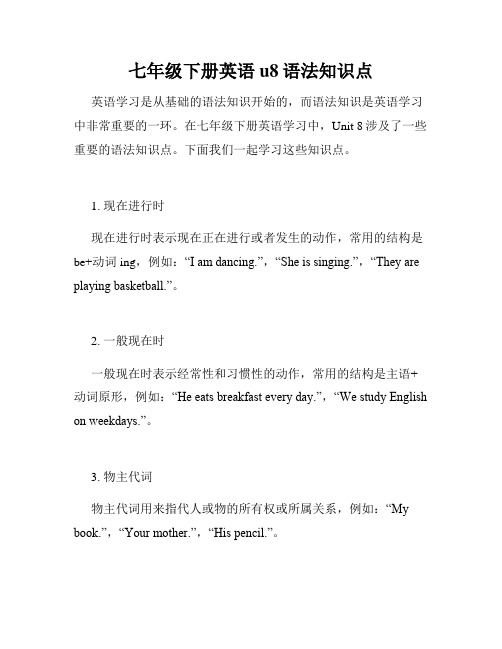
七年级下册英语u8语法知识点英语学习是从基础的语法知识开始的,而语法知识是英语学习中非常重要的一环。
在七年级下册英语学习中,Unit 8涉及了一些重要的语法知识点。
下面我们一起学习这些知识点。
1. 现在进行时现在进行时表示现在正在进行或者发生的动作,常用的结构是be+动词ing,例如:“I am dancing.”,“She is singing.”,“They are playing basketball.”。
2. 一般现在时一般现在时表示经常性和习惯性的动作,常用的结构是主语+动词原形,例如:“He eats breakfast every day.”,“We study English on weekdays.”。
3. 物主代词物主代词用来指代人或物的所有权或所属关系,例如:“My book.”,“Your mother.”,“His pencil.”。
4. 疑问词疑问词用来引导疑问句,例如:“What is your name?”,“Where do you live?”,“Who is your teache r?”。
5. 情态动词情态动词用来表示说话人在语气和态度上的情感色彩,例如:“can”表示能力,“may”表示许可,“should”表示建议等。
6. 句型转换在英语学习中,句型转换是非常重要的一项能力。
学生需要掌握如何将一种句型转换成另一种句型,例如将一般现在时转换成现在进行时,在“主语+动词原形”的结构中加入be动词的ing形式,例如:“I eat breakfast every day.”转换成“I am eating breakfast now.”。
以上是七年级下册英语Unit 8的一些重要语法知识点,希望同学们能够掌握好这些知识点,在英语学习中取得更好的成绩。
仁爱英语七年级下册unit8 知识点
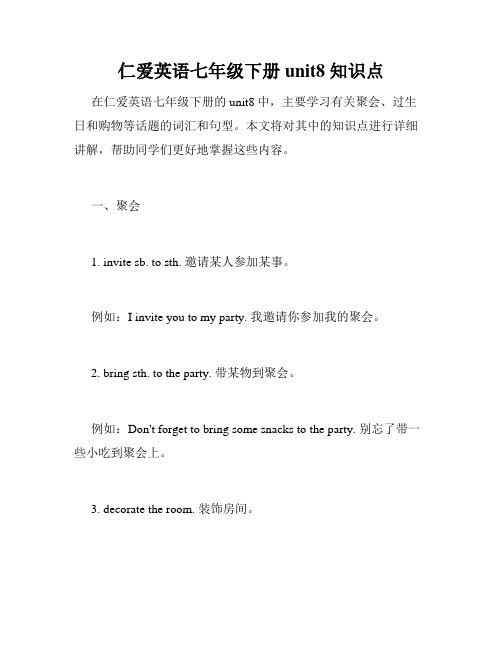
仁爱英语七年级下册unit8 知识点在仁爱英语七年级下册的unit8中,主要学习有关聚会、过生日和购物等话题的词汇和句型。
本文将对其中的知识点进行详细讲解,帮助同学们更好地掌握这些内容。
一、聚会1. invite sb. to sth. 邀请某人参加某事。
例如:I invite you to my party. 我邀请你参加我的聚会。
2. bring sth. to the party. 带某物到聚会。
例如:Don't forget to bring some snacks to the party. 别忘了带一些小吃到聚会上。
3. decorate the room. 装饰房间。
例如:We need to decorate the room before the party. 我们需要在聚会前装饰房间。
二、过生日1. Happy birthday! 生日快乐!2. blow out the candles. 吹灭蜡烛。
例如:Make a wish and blow out the candles. 许个愿望,然后吹灭蜡烛。
3. cut the cake. 切蛋糕。
例如:Let's sing "Happy birthday" and cut the cake. 让我们唱“生日快乐歌”然后切蛋糕。
三、购物1. How much is it? 多少钱?例如:How much is this T-shirt? 这件T恤多少钱?2. Can I try it on? 可以试穿一下吗?例如:Excuse me, can I try on these shoes? 不好意思,我能试穿这双鞋吗?3. I'll take it. 我要买了。
例如:This bag is perfect, I'll take it. 这个包非常完美,我要买了。
以上便是仁爱英语七年级下册unit8的主要知识点,同学们可以通过这些词汇和句型,更好地应对有关聚会、过生日和购物等话题的会话。
人教版英语七年级下册Unit 8重点词汇、语法自测(附答案)

U8重点词汇、短语练习题一、单项选择1. —What is Jim doing? —He's watching some boys basketball on the playground.A. playB. to playC. playingD. plays2. My English teacher is very beautiful and _____a movie star.A. looks afterB. looks likeC. looks upD. looks at3. I the whole afternoon in shopping a birthday present.(恩施)A. spent; inB. paid; forC. spent; for4. Lots of people enjoy this park on weekends.A. visitB. visitingC. to visitD. visited5. the early bus, he often gets up early.A. CatchB. To catchC. CatchingD. Catches6. Small cars are useful in cities with narrow (狭窄的)_______. (沈阳)A. streetsB. cinemasC. squaresD. shops7. —Are you watching the football matches of the World Cup (世界杯足球赛) these days?—Sometimes, and I’ll watch the match_______ Japan and Poland tonight. (包头)A. againstB. aboutC. throughD. between8. The accident happened (发生) 7 p. m.________ 9 p. m. (呼和浩特改编)A. from; toB. between; toC. from; andD. between; and9. —Mum, there only a tomato and three eggs in the fridge. How about going to the supermarket now?—That's a good idea.A. isB. areC. hasD. have10. Jim sits behind me, so I sit him.(南宁)A. at the top ofB. at the end ofC. in the middle ofD. in front of二、根据首字母或汉语提示完成句子1. It's time for lunch. Let's go to a r.2. When we go on a trip, we live in a h.3. He p$200 a week for this apartment(公寓套房).4. He doesn't feel well, so his parents take him to a h.5. I sit b the tall boy, so I can't see the blackboard clearly.6. There are some _________ (猴子) in the zoo.7. The shop is just (刚刚)open. You can get some________ (免费的)food there.8. Walk along the road and you can find the subway station _________(容易地). (贵港)9. Tom usually________ (花费) lots of time reading books.10. The little cat ________(爬) up the tree and couldn’t come down.11.里克在公园对面的中国银行上班。
七下U8知识清单

七年级下册Unit 8 I’ll help to clean up the city parks. 知识清单Section A一、单词:clean up,cheer,cheer up,give out,volunteer,e up with,put off,sign,notice,hand out,call up,used to,lonely,care for,homeless,raise,alone二、重点短语和知识点1.clean up 打扫(或清扫)干净2.cheer up (使)变得更高兴,振奋起来3.give out 分发,散发4 e up with = think up想出,提出(主意,计划,回答等)5.put up 张贴6.put off (doing sth.) 推迟7.hand out 分发8.call up 打给(某人),征召9.care for 照顾,非常喜欢10.help out 帮助解决问题或摆脱困境11.be busy with…/ be busy doing…忙于某事12.raise money for homeless people 为无家可归的人筹钱13. a good way to do sth. 一个做某事的好方法14.make plans to do sth. 制定计划做某事15.try out 参加…选拔,试用16.volunteer to do sth. 自愿做某事ed to do sth. 过去常常做某事, be used to doing sth. 习惯于做某事18.stop doing sth. 停止做某事,stop to do sth. 停下来去做另一件事19.区别alone 和lonely:alone:adv.单独,独自;lonely: adj. 孤独的,寂寞的20.help do sth. / to do sth. /with sth…帮助做三、句子1. 你可以帮助清扫城市公园。
七年级下册英语 u8知识点
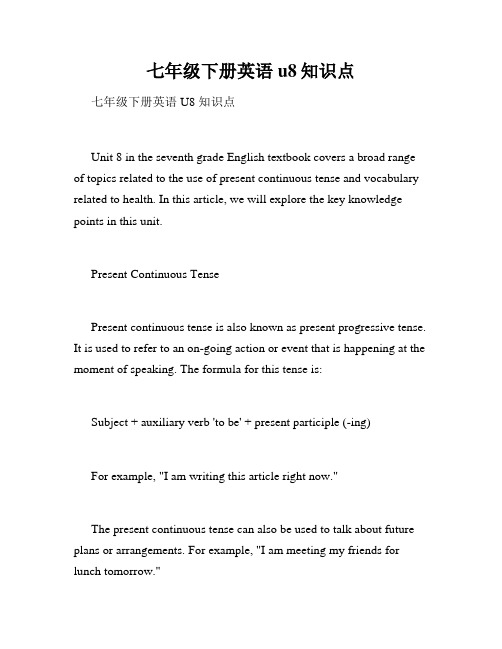
七年级下册英语 u8知识点七年级下册英语 U8 知识点Unit 8 in the seventh grade English textbook covers a broad range of topics related to the use of present continuous tense and vocabulary related to health. In this article, we will explore the key knowledge points in this unit.Present Continuous TensePresent continuous tense is also known as present progressive tense. It is used to refer to an on-going action or event that is happening at the moment of speaking. The formula for this tense is:Subject + auxiliary verb 'to be' + present participle (-ing)For example, "I am writing this article right now."The present continuous tense can also be used to talk about future plans or arrangements. For example, "I am meeting my friends for lunch tomorrow."Vocabulary on HealthThe unit also introduces a wide range of vocabulary related to health, such as symptoms, illness, and ways to keep healthy.Some of the key words and phrases include:- Headache: a pain in the head- Stomachache: a pain in the stomach- Fever: a high body temperature- Sore throat: a pain in the throat- Cough: a sudden expulsion of air from the lungs- Flu: a viral infection that causes fever, headache, and muscle aches- Healthy: in good physical or mental condition- Exercise: physical activity that improves health- Diet: the food and drink that a person regularly consumes- Sleep: a period of rest when the body recovers from fatigueGrammar ExercisesTo ensure a complete understanding of the present continuous tense and grammar related to health vocabulary words, the unit includes several exercises that require students to use the vocabulary words in sentences and select the correct form of the present continuous tense.For example, students may be asked to complete the following sentence: "I ________ (study) English now." The correct answer would be "am studying."In another exercise, students may be asked to match a set of symptoms to the corresponding illness. This exercise helps to expand their vocabulary and improve their understanding of health-related terminology.ConclusionThe present continuous tense and vocabulary related to health are essential components of English communication. The knowledge points covered in Unit 8 provide a solid foundation for students to communicate clearly and accurately in English. By mastering these concepts throughout their studies, students will be well equipped for future English language use.。
七年级下册u8的知识点
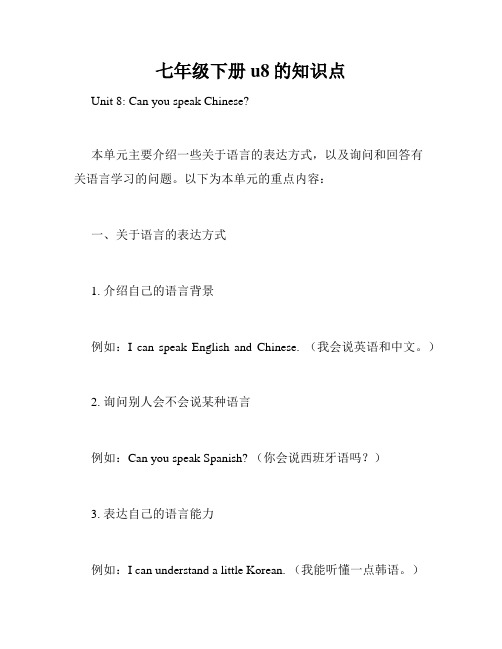
七年级下册u8的知识点Unit 8: Can you speak Chinese?本单元主要介绍一些关于语言的表达方式,以及询问和回答有关语言学习的问题。
以下为本单元的重点内容:一、关于语言的表达方式1. 介绍自己的语言背景例如:I can speak English and Chinese. (我会说英语和中文。
)2. 询问别人会不会说某种语言例如:Can you speak Spanish? (你会说西班牙语吗?)3. 表达自己的语言能力例如:I can understand a little Korean. (我能听懂一点韩语。
)4. 询问别人的语言能力例如:How about you? Can you read French? (你呢?你能读懂法语吗?)二、关于语言学习的问答1. 询问学习的语言种类例如:What language are you learning now? (你现在在学什么语言?)2. 询问学习语言的方法例如:How do you learn Japanese? (你怎么学日语?)3. 描述学习语言的方法例如:I learn English by watching English movies. (我通过看英语电影学习英语。
)4. 表达语言学习的困难例如:I find it difficult to pronounce some French words. (我发现有些法语单词发音很困难。
)三、其他重点1. 介绍自己的语言老师例如:My Chinese teacher is very nice. (我的中文老师很好。
)2. 关于语言的名言警句例如:Learning a new language is like becoming a new person. (学一门新的语言,就像变成一个新人一样。
)总的来说,本单元涵盖了关于语言的多个方面,不仅有语言本身的表达方式,还有针对学习语言的一系列问题。
七年级下册u8知识点归纳

七年级下册u8知识点归纳七年级下册的第八单元主要介绍了中国传统文化的相关知识。
本文将对这些知识点做一个归纳总结。
一、华夏文明华夏文明是指中国历史上的中华文化,是中华民族传统文化的基石。
它源远流长,有着悠久的历史。
包括中华文化的宗教信仰、哲学思想、文学艺术、工艺制造等等。
二、封建社会封建社会是指在中国古代,由王朝皇帝领导下的一种政治制度。
这种制度分为四级:皇帝、贵族、平民和奴隶,共同组成了一个类似于金字塔形式的社会结构。
这种制度下,权力高度集中在皇帝和贵族手中,老百姓没有太多发言权。
三、四大发明四大发明是指古代中国的四项伟大发明:造纸术、印刷术、火药和指南针。
这些伟大的发明不仅创造了历史,还改变了世界。
造纸术使得书籍的印刷和传播变得容易,印刷术让知识可以更快更广泛地传播,火药在战争中起到了非常重要的作用,指南针则使得航海变得更加准确和安全。
四、丝绸之路丝绸之路是古代中国和欧洲/中东/东南亚之间的贸易路线。
这条路线展示了中华文化和西方文明之间的交流和沟通,也促进了世界文化的发展和融合。
通过丝绸之路,中华文化传到了欧亚大陆,也让中国了解到了外面的世界。
五、九州九州是中国古代人对中国地域的划分,通常指的是整个华夏地区和周围地区。
九州可以分为东北、北方、西北、中原、西南、南方、中南、东南和海南,每个九州都有其独特的特征和风景。
综上所述,七年级下册的第八单元主要介绍了中国传统文化的相关知识,包括华夏文明、封建社会、四大发明、丝绸之路以及九州等知识点。
这些知识点不仅具有历史价值,也有着现实意义。
我们在学习这些知识的同时,也应该发扬这些文化传统,传承中华文明。
七年级下册仁爱英语u8知识点
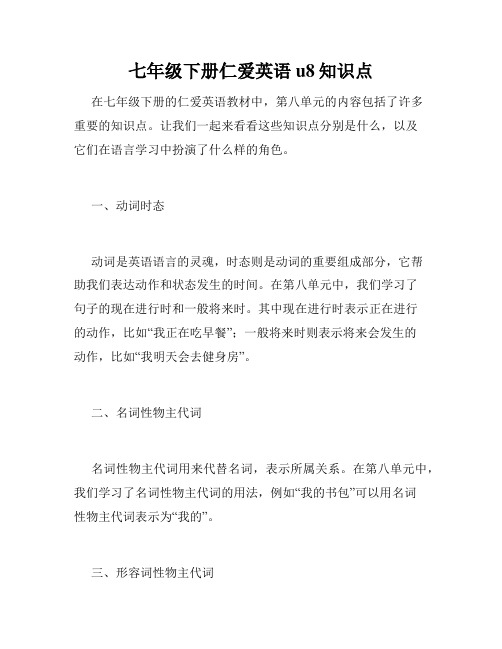
七年级下册仁爱英语u8知识点在七年级下册的仁爱英语教材中,第八单元的内容包括了许多重要的知识点。
让我们一起来看看这些知识点分别是什么,以及它们在语言学习中扮演了什么样的角色。
一、动词时态动词是英语语言的灵魂,时态则是动词的重要组成部分,它帮助我们表达动作和状态发生的时间。
在第八单元中,我们学习了句子的现在进行时和一般将来时。
其中现在进行时表示正在进行的动作,比如“我正在吃早餐”;一般将来时则表示将来会发生的动作,比如“我明天会去健身房”。
二、名词性物主代词名词性物主代词用来代替名词,表示所属关系。
在第八单元中,我们学习了名词性物主代词的用法,例如“我的书包”可以用名词性物主代词表示为“我的”。
三、形容词性物主代词形容词性物主代词同样用来表示所属关系,但它们用于修饰名词。
在第八单元中,我们学习了形容词性物主代词的用法,例如“我的书包很漂亮”可以用形容词性物主代词表示为“我的漂亮的书包”。
四、疑问词疑问词是用来询问信息的词语,它们在交流中非常重要。
在第八单元中,我们学习了一些常用的疑问词,例如“what”、“when”、“where”等等。
五、祈使句祈使句是一种表示命令、建议或请求的语句。
在第八单元中,我们学习了祈使句的用法,例如“请把你的书递给我”,其中“请”就是祈使句的标志。
六、情态动词情态动词用来表达说话人的意愿、建议、推测等等。
在第八单元中,我们学习了一些常用的情态动词,例如“should”、“can”、“will”等等。
七、比较级和最高级比较级和最高级是用来表示程度和大小的语法形式。
在第八单元中,我们学习了比较级和最高级的用法,并通过练习加深了对它们的理解。
八、连词连词是用来连接两个句子或短语的词语。
在第八单元中,我们学习了一些常用的连词,例如“and”、“but”、“or”等等。
总之,第八单元涵盖了许多英语语言学习的重要知识点。
通过学习这些知识点,不仅能够提高我们的英语能力,还能够帮助我们更好地理解和使用英语语言。
七年级下册英语u8知识点
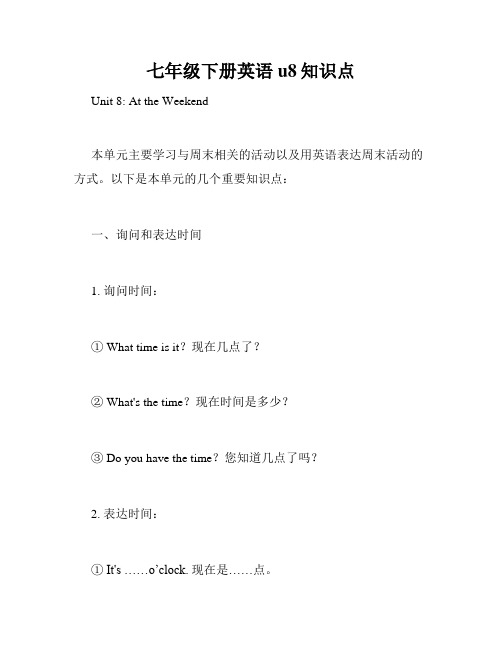
七年级下册英语u8知识点Unit 8: At the Weekend本单元主要学习与周末相关的活动以及用英语表达周末活动的方式。
以下是本单元的几个重要知识点:一、询问和表达时间1. 询问时间:① What time is it?现在几点了?② What's the time?现在时间是多少?③ Do you have the time?您知道几点了吗?2. 表达时间:① It's ……o’clock. 现在是……点。
② It's half past ……现在是……点半。
③ It's a quarter to …… 现在差15分钟到……点。
(1/4h)④ It's a quarter past …… 现在是……点15分。
(1/4h)二、询问和表达周末计划1.询问周末计划① What are you going to do at the weekend?你周末打算干什么?② What's your plan for the weekend?你周末有什么计划?2. 表达周末计划① I'm going to …… 我打算……② I'm planning to …… 我计划……③ I'm thinking of …… 我想……三、使用时间状语时间状语是指强调一个动作或事件发生的时间。
如:① in the morning 在早晨② in the afternoon 在下午③ in the evening 在晚上④ on Saturday/Dunday 在星期六/星期天四、使用连词在表达时间或活动时,可以使用以下连词:1. and:用于列举类似的活动,如:I am going to read books and watch TV.我要读书和看电视。
2. but:用于表达转折,如:I want to play football, but it's raining outside.我想踢足球,但外面在下雨。
七年级下册英语U8

adj. lively
生动的
adv actually 事实上 alone 独自
pron. anybody 任何人
in the future 将来
used to
曾经
go outside
外出
look like
看起来像
more and more 越来越多
grow up
长大
go sailing
去进行帆船运动
单项选择。
(C)1. Daisy ____ me with my English homework, but she doesn’t now.
A. used to helping B. is used to help
C. used to help D. uses to help
( B)2. We will go to the park ____ the weather is fine.
七年级下册英语U8
n
career 事业
planet 行星
satellite 卫星
velvet
丝绒;天鹅绒
diamond 钻石
knowledge 知识
V shoot host last achieve sail decide train
射;冲;飞驰 主持 持续 达到 驾驶帆船航行 决定 训练 ;接受训练
4. The meeting l_a_s_t_e_d for one hour yesterday.
5. If you work hard, you can a_c_h_ie_v_eyour goal one day.
根据中文意思完成句子
1、在将来,我想成为一名医生。 I want to be a doctor ___i_n_t_h_e__f_u_t_u_r_e_.
人教七年级英语下册U8 单元重点知识
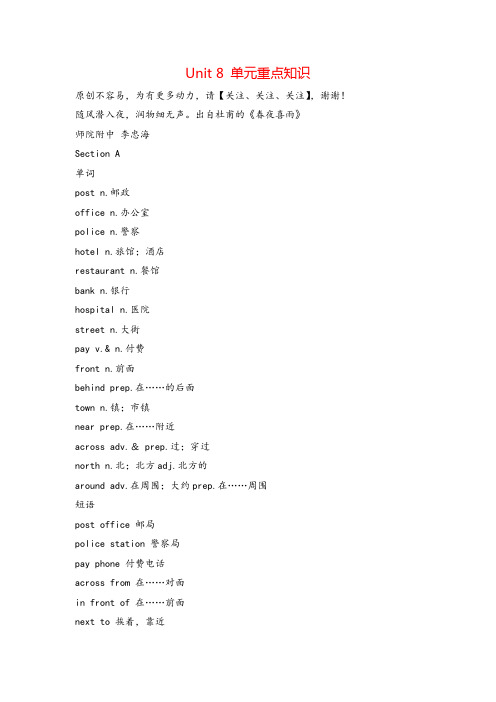
Unit 8 单元重点知识原创不容易,为有更多动力,请【关注、关注、关注】,谢谢!随风潜入夜,润物细无声。
出自杜甫的《春夜喜雨》师院附中李忠海Section A单词post n.邮政office n.办公室police n.警察hotel n.旅馆;酒店restaurant n.餐馆bank n.银行hospital n.医院street n.大街pay v.& n.付费front n.前面behind prep.在……的后面town n.镇;市镇near prep.在……附近across adv.& prep.过;穿过north n.北;北方adj.北方的around adv.在周围;大约prep.在……周围短语post office 邮局police station 警察局pay phone 付费电话across from 在……对面in front of 在……前面next to 挨着,靠近between … and …在……和……之间句型1.—Are there any restaurants near here? 这附近有餐馆吗?—Yes, there’s one in front of the post office. 是的,邮局的前面有一个。
2.—Where’s the park? 公园在哪里?—It’s across from the bank, behind the hotel. 它在银行对面,旅馆的后面。
3.—Is there a bank near here?这儿附近有银行吗?—Yes, there is.是的,有。
Section B单词along prep.沿着turn v.转向;翻right adv.向右边 n.右边left adv.向左边n.左边crossing n.十字路口climb v.爬road n.路spend v.花(时间、钱等)often adv.时常;常常air n.空气free adj.免费的enjoy v.享受;喜爱easily adv.容易地money n.钱monkey n.猴子neighborhood n.街区;街坊sunshin n.阳光短语excuse me 打扰了,劳驾go along(the street)沿着(这条街)turn right/left 向右/左转on the/one’s right/left 在……右边 / 左边spend time花时间watch sb. doing sth. 观看某人正在做某事look like 看起来像in life生活中,一生中be free免费/有空enjoy reading喜欢阅读句型1.Go along New Street. Turn rght at the first crossing.沿着新街走。
- 1、下载文档前请自行甄别文档内容的完整性,平台不提供额外的编辑、内容补充、找答案等附加服务。
- 2、"仅部分预览"的文档,不可在线预览部分如存在完整性等问题,可反馈申请退款(可完整预览的文档不适用该条件!)。
- 3、如文档侵犯您的权益,请联系客服反馈,我们会尽快为您处理(人工客服工作时间:9:00-18:30)。
Step 1
Show the picture of different places and let students guess.
Step 2 T: Now please think about prepositions for position
Pronunciation & Intonation 2’
Voice 1’
Manners 1’
Content 1’
T: Do you know the name of this…?
S; Yes, and it’s on…
T: Is there a…?
Where can you read books? ------ library
Step 3. Listening:
T: Now let’s listen to the tape, and fill in the blanks in 2b
The students check the answers.
No 1students could try to draw a map and retell the positions.
Show the Chinese and English translations of different prepositional words and let students memorize. Later show the pictures of them and say the right positions.
Where can you get money? -------- bank
Where can you buy food and drinks? / eat food --------- supermarket/ restaurant
Later show the pictures describing the prepositional words and let students answer.
Step 3: Are there any places we talked about in the neighborhood? Where are they and can you describe?
教学
重点
①Where引导的特殊疑问句。
②there be句型的肯定式、一般疑问句及其回答方式。
③方位介词的用法。
教学
难点
让学生学会运用方位介词。
项目
及
要求
Make up a conversation of showing directions.
项目
设置
意图
Let students put language into use when talking about things around them.
Step 4. Pair work
Listen to the tape of 2d and try to answer the questions
Step 5. Role-play
One student is a new visitor to the city and the other student try to give directions.
X. Quiz
1. P45 3a &3b
One student comes to the front of the class and gives a presentation to them. Then the students are asked to answer some questions about the presentation.
石家庄外国语教育集团七年级
“四自主·四环节”课堂英语学科教学设计
日期
4月20日
学科
英语
教师
课型
听说课
课时
1
课题
Unit 8 Is there a post office near hear? Section A
教学
目标
一、教学目标:
1.语言知识目标:
1)能掌握以下单词:post, office, post office, police, police station, hotel, restaurant, bank, hospital, street, pay, near, across, across from, front, in front of, behind, town, around能掌握以下句型:
——Where引导的特殊疑问句及其答语。
——学会There is / are…。Is/are there..的句型及用法。
2. Ability Object(语言技能目标):
通过运用问路和引路的交际用语,帮助各个层次的同学树立自信心,敢于用英语进行交际
3、Moral attitude(情感目标):
a通过运用简单的问路和引路的交际用语,学会相互合作,培养乐于助人的精神。
教学过程(项目实施——交流展示——评价激励)
教师活动
学生活动
项目准备:
1.学生提前预习课本Section A并完成项目书项目准备。
2.准备自己在石家庄经常去的场所并描述他的位置,介绍其周围标志建筑。I. Presentation
1.Ask one student to share her presentation in front of the class.
1.①—Is Biblioteka here a hospital near here? —Yes, there is.
②The pay phone is across from the library.
③The pay phone is between the post office and the library. 2)能了解以下语法:
2.Ask them some questions after the presentation.
3.Give them some comments.
II. Show the project today.
. Lead-in:
Show the pictures brought by the students and let students describe or introduce.
